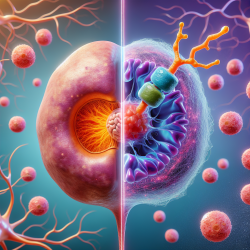Understanding Oxidative Stress in Autism: A Guide for Practitioners
Recent research has unveiled significant findings regarding oxidative stress and its impact on the autism brain. The study titled "Evidence of oxidative damage and inflammation associated with low glutathione redox status in the autism brain" provides a comprehensive analysis of how oxidative stress biomarkers are altered in individuals with autism. As a practitioner, understanding these findings can enhance your approach to supporting individuals with autism.
Key Findings from the Research
- Decreased levels of reduced glutathione (GSH) and the GSH/GSSG redox ratio were observed in the cerebellum and Brodmann area 22 (BA22) of individuals with autism.
- Increased markers of oxidative protein damage (3-nitrotyrosine) and oxidative DNA damage (8-oxo-deoxyguanosine) were found in these brain regions.
- Elevated levels of 3-chlorotyrosine indicated a chronic inflammatory response, while decreased aconitase activity suggested increased mitochondrial superoxide production.
Implications for Practitioners
The study suggests that oxidative stress and glutathione imbalance may contribute to the neuropathology of autism. Here are some ways practitioners can use this information:
- Integrate Antioxidant Strategies: Consider incorporating antioxidant-rich interventions in your therapeutic approaches to help mitigate oxidative stress in individuals with autism.
- Monitor Biomarkers: Regularly assess oxidative stress biomarkers in patients to tailor interventions and track progress.
- Encourage Further Research: Stay updated with ongoing research in oxidative stress and autism to refine and enhance your practice.
Encouraging Further Exploration
While this study provides valuable insights, it also opens the door for further research. Practitioners are encouraged to explore the following areas:
- Investigate the potential benefits of specific antioxidant supplements in reducing oxidative stress in autism.
- Examine the relationship between oxidative stress and behavioral symptoms in autism to develop targeted interventions.
- Explore the role of diet and lifestyle modifications in managing oxidative stress in individuals with autism.
To read the original research paper, please follow this link: Evidence of oxidative damage and inflammation associated with low glutathione redox status in the autism brain.










